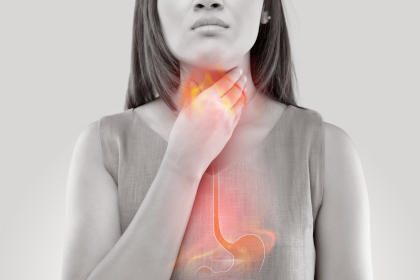Gastroesophageal reflux disease (GERD) is a common stomach disorder that causes acid reflux (backflow) symptoms such as heartburn, chest pain, and bloating.
Medbox: Never Sort Medications Again
GERD affects around 20% of adults in the USA and can lead to tooth decay and increased risk for esophageal cancer if untreated.
Infrequent episodes of GERD symptoms are common and may not need treatment, but severe or chronic GERD symptoms should be addressed as they can damage your body tissues and lead to precancerous changes of cells in the esophagus.
In this article, we will discuss everything about gastroesophageal reflux disease, its symptoms, causes, treatment, prevention, and more. So, let’s get started.
What Is Gastroesophageal Reflux Disease?
Gastroesophageal reflux disease, abbreviated as GERD, is a disorder that causes backflow (regurgitation) of stomach acid into the esophagus. The esophagus is a hollow tube that connects your throat to the stomach, allowing for food passage.
GERD symptoms commonly occur after eating a large or heavy meal or lying down immediately after eating.
Chronic gastroesophageal reflux disease is when you constantly experience acid reflux two times a week or more for several weeks. It means that your body is unable to hold the acid in your stomach. This is a severe form of GERD that needs to be treated.
What Are the Possible Causes of Gastroesophageal Reflux Disease?
Gastroesophageal reflux disease commonly occurs due to the weakening or damage to a valve, known as the esophageal sphincter, that prevents the backflow or re-entering of the stomach contents into the esophagus.
The damage or weakening of the esophageal sphincter may occur due to various conditions or disorders, such as:
- Obesity or pregnancy as it increases pressure on the abdomen.
- Family history of GERD
- Hiatal hernia – a condition where the top aspect of the stomach bulges into the chest
- Smoking; as it weakens the esophageal sphincter.
- Certain foods irritate or inflame the esophagus or esophageal sphincter, like spicy, fried, and fatty foods, alcohol, or coffee.
- The side effects of certain medications, like iron or potassium supplements, antibiotics, some heart medications, or painkillers, may also cause GERD.
Symptoms of Gastroesophageal Reflux Disease

The common symptoms of gastroesophageal reflux disease include:
- Bloating, stomach pain, or discomfort
- Nausea or vomiting
- Chest pain
- Heartburn
- A sour or bitter taste in the mouth or throat
- Difficulty swallowing
- Coughing
- Burping
- Feeling backflow of food in the throat
- A feeling of a lump in the throat
- Bad breath
- Asthma-like symptoms
- Hiccups
- Hoarseness
No More Pill Sorting! Our Pharmacy Pre-sorts and Packages Your Pills
Diagnosis of Gastroesophageal Reflux Disease
The initial diagnosis of GERD is typically done through a physical examination and evaluation of symptoms, lifestyle, and eating habits.
To confirm the diagnosis of GERD, one or more of the following tests may be performed (if necessary):
Upper Endoscopy
An upper endoscopy is a procedure that is done to visually examine the inside picture of the esophagus and stomach by inserting a long, flexible tube.
The tube has a camera attached to its end that helps visualize the stomach and esophagus to detect inflammation or other signs of acid reflux.
pH Monitoring
This procedure monitors the amount of acid that is refluxed into the esophagus. A thin tube with a pH sensor is inserted via the nose or mouth into the esophagus to measure the level of acidity. Patients sometimes will keep a food log and track their symptoms to determine if certain dietary items trigger worsening acidity in the esophagus.
Esophageal Manometry
In patients with chronic and severe GERD (frequently untreated), esophageal manometry is a test that checks the function and movement of your esophagus. It helps diagnose esophageal disorders that may be responsible for interfering with the movement of food or causing reflux of stomach content.
Gastroesophageal Reflux Disease Treatments
The first line of treatment for GERD is non-prescription medications and lifestyle changes. Avoidance of trigger foods or lying down immediately after meals may help. If patients are overweight or obese, appropriate weight loss may also alleviate symptoms. If the condition persists, surgical procedures may be done to treat gastroesophageal reflux disease.
The treatment options for GERD include:
1. Medications
The medications for GERD work by decreasing or neutralizing acid production in the stomach. It helps reduce acid reflux or the backflow of acid in the esophagus. The medicines given in GERD include:
- Antacids
- Histamine H-2 blockers, like nizatidine (by prescription) or famotidine (over the counter)
- Proton pump inhibitors (PPIs), like omeprazole, pantoprazole, lansoprazole, or dexlansoprazole
2. Surgery
Surgery is commonly done when medicines are ineffective in treating or reducing the symptoms of GERD.
The surgical procedures for GERD include:
Transoral Incisionless Fundoplication (TIF)
Transoral incisionless fundoplication involves wrapping the junction (connecting point) between your esophagus and stomach with a fastening device to create a tight valve, preventing acid reflux in the esophagus.
The procedure is non-surgical and is done by inserting a thin, flexible tube (endoscope) in your mouth with an attached device to secure the gastroesophageal junction.
LINX Device
LINX is a tiny, magnetic, ring-like device inserted between the esophagus and stomach to inhibit acid reflux or backflow.
It is a surgical procedure that implants the magnetic device at the lower end of the esophagus.
The magnetic device is strong enough to prevent acid reflux but flexible enough to allow food to pass into the stomach.
Get Your Pills Pre-sorted and Delivered at No Extra Cost
Can GERD Be Cured Permanently?
While GERD may not be permanently curable, specific lifestyle changes and medications can help reduce the symptoms of GERD.
The following lifestyle modifications or gastroesophageal reflux disease self-care can help prevent and cure GERD:
- Avoid or completely eliminate foods from your diet that trigger acid reflux, like spicy and fatty foods, alcohol, coffee, tea, chocolate, and carbonated beverages.
- Avoid smoking and use of nicotine-containing products.
- A large amount of food in your stomach can increase acid production, triggering reflux. So, instead of eating one or two large meals in a day, increase the number of your small meals. Moreover, take small bites and eat slowly.
- Do not lie down immediately after eating. Try having your meals at least two to three hours before going to bed. Avoid late-night snacks or naps after lunch.
- Some medications, like painkillers (both NSAIDS and narcotic-based medications), also cause acid reflux. If you are using long-term medications other than the ones that treat GERD, discuss your acid reflux issue with your doctor and identify if any of your medications may be triggering GERD. Avoid using painkillers.
- Lose weight if you are obese or overweight. Excessive weight can put pressure on your stomach, leading to GERD.
Foods That Help Prevent GERD
The following foods can help prevent GERD:
- Fibrous foods make you full faster and prevent the chances of overeating. Some fiber-rich foods include oatmeal, brown rice, green beans, broccoli, asparagus, carrots, and beets.
- Alkaline or less acidic foods, like nuts, cauliflower, melons, bananas, avocados, and fennel.
- Watery foods, such as cucumber, watermelon, lettuce, herbal tea, and broth-based soups, can help dilute stomach acids.


